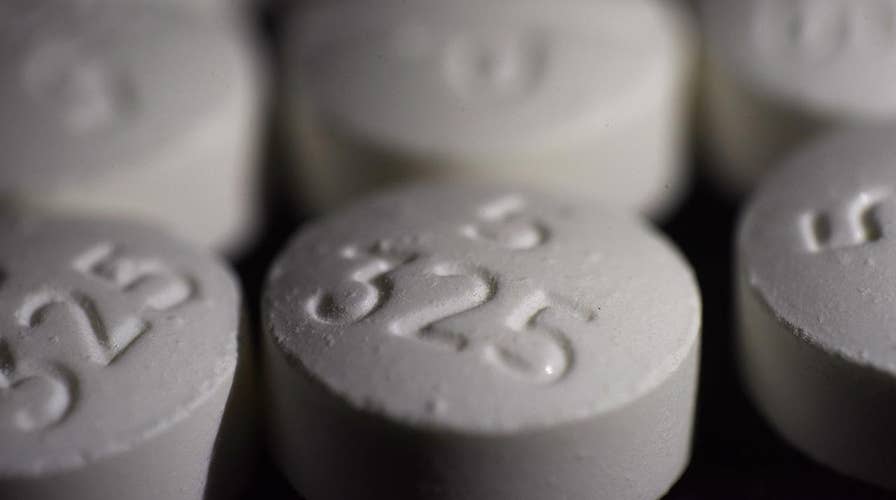New research into non-addictive alternative to opioids
A new pain medication being developed at Indiana University is showing promise.
Today nearly 100 Americans will die from a drug overdose involving prescription drugs. Since 1999, deaths from prescription opioid overdose have more than quadrupled. Many have suggested this crisis will only get worse before it gets better – with some estimates suggesting we could lose half a million Americans in the next decade.
Parents are losing sons and daughters, children are losing parents and countless families are searching for a way to combat addiction and save the life of their loved one.
President Donald Trump just declared a national public health emergency in response to the opioid crisis. As members of the Republican Main Street Working Group on Substance Abuse, we welcome this much-needed step.
Together, we represent more than 5 million people in five states. Our home districts have seen hundreds of lives lost to this epidemic.
Opioid addiction and abuse is affecting families from all walks of life, and together we are committed to providing solutions.
This is not a Republican issue or a Democratic issue – this is about saving lives.
We created the working group with that principle in mind. From the many different pieces of legislation the members of this group have introduced, we have coalesced around a plan of action with three main principles.
First, we must provide law enforcement with the tools they need to address and stop the growing prevalence of synthetic drugs, like fentanyl. Further steps must also be taken to outlaw synthetic drugs that have been identified by the Drug Enforcement Agency (DEA) as an immediate threat, and give the DEA the expedited authority to classify new synthetic drugs as illegal. This will allow investigators and prosecutors to keep up with the synthetic drugs that are being so widely distributed into our communities.
Increased enforcement is necessary, but we fully recognize that we cannot arrest and prosecute our way out of this crisis. By providing more pathways to treatment, we can better help those struggling with addiction. This includes removing the structural barriers posed by Medicaid so we can improve access to treatment for our country’s most vulnerable. Under current law, states are unable to use federal funding for inpatient mental health and substance abuse treatment. There are exceptions to this rule but with limitations based on population, facility size, and length of stay. These limitations disproportionately affect those with the greatest need.
Opioid addiction has also taken a tragic toll on children born to mothers who are addicted. Over 22,000 babies are born every year with neonatal opioid withdrawal, and families often struggle to pay for the treatment necessary to save these precious new lives. Authorizing Medicaid coverage for currently excluded facilities that specialize in neonatal withdrawal treatment would help more babies reach their full, healthy potential.
It is also critical to increase education and training efforts, particularly those aimed at protecting our nation’s youth. By allowing the Centers for Disease Control and Prevention to expand current education efforts and share more information on treatment and recovery resources, we can prevent more young Americans from going down the path of addiction. We can also provide grants through the Department of Health and Human Services to make the life-saving drug naloxone available to more communities, and to help those communities better train first responders to administer the drug during an overdose.
As we work to treat addiction and prevent opioid abuse and misuse, we must maintain vigilant oversight of the laws we have already passed.
Earlier this year, the first round of funding from the $1 billion 21st Century Cures Act was delivered to state programs for addiction recovery and treatment. Those grants are already starting to save lives and we must ensure that funding continues to help those in need. Last year, both houses of Congress also came together to pass the bipartisan Comprehensive Addiction and Recovery Act. This legislation advances the study of new and innovative ways to combat opioid addiction. We look forward to the results of this program and are encouraged by the progress National Institutes of Health has already made.
Addiction does not discriminate, and there is no one-size-fits-all response to this crisis facing our nation.
As members of the Working Group on Substance Abuse, we are dedicated to finding life-saving solutions and remain committed to helping families, law enforcement, and health care professionals better access the tools they need to prevent opioid abuse and misuse.
U.S. Representatives Barbara Comstock (R-VA), Ryan Costello (R-PA), Rodney Davis (R-IL), Dan Donovan (R-NY), Brian Fitzpatrick (R-PA), Tom MacArthur (R-NJ) and Pat Meehan (R-PA) are members of the Republican Main Street Partnership and founding members of the Partnership’s Working Group on Substance Abuse.





















